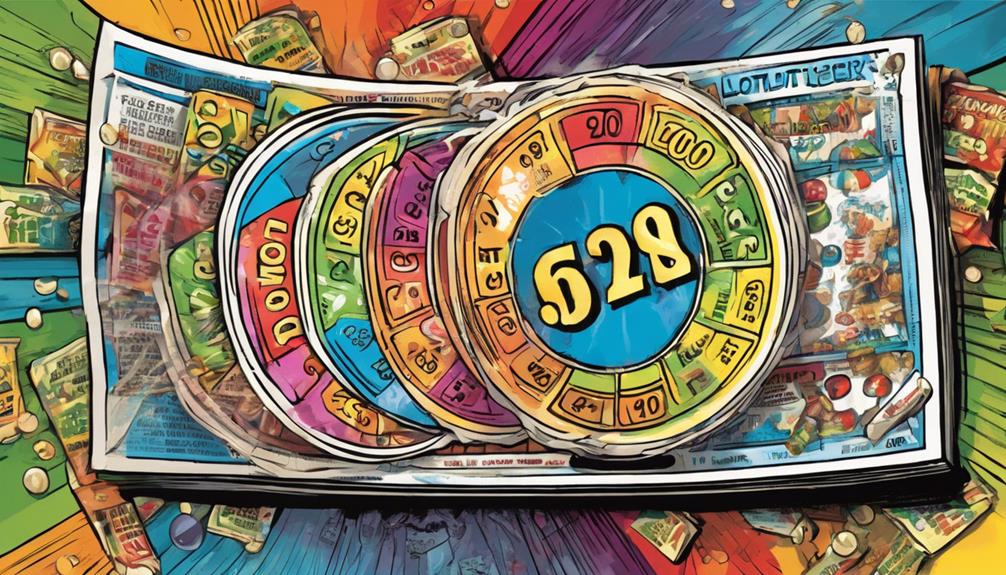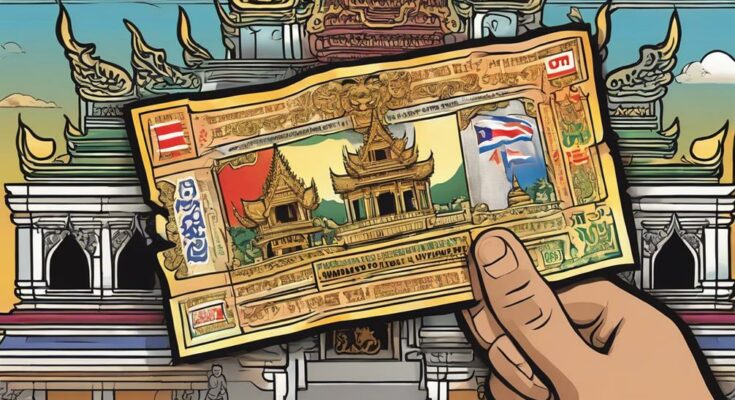Thailand’s lottery regulations are overseen by the Government Lottery Office (GLO) and established under the Government Lottery Office Act B.E. 2517. The regulations cover a structured framework including ticket purchasing rules, prize distribution, charitable contributions, enforcement against underground lotteries, tax implications, and transparency measures. Understanding these important aspects is vital for maintaining Thailand’s fair and regulated gaming environment. Each element plays a significant role in shaping the country’s lottery landscape and ensuring integrity within the system. Explore the detailed outline provided for a detailed insight into Thailand’s lottery regulations.
Key Takeaways
- The Government Lottery Office oversees Thailand’s lottery system under the Government Lottery Office Act.
- Thai lottery tickets are sold in pairs at a fixed cost of 160 baht to ensure fairness.
- Prize categories range from 2 million to 30 million baht with specific claiming procedures.
- Charitable contributions from the lottery support the Thai Red Cross, community projects, and scholarships.
- Severe penalties, including fines and imprisonment, deter engagement in illegal lottery activities.
1. Legal Framework and Governing Body

The Government Lottery Office (GLO), a state enterprise with a defined legal mandate, establishes and enforces the legal framework overseeing Thailand’s lottery system. The Government Lottery Office Act B.E. 2517, enacted in 1974, solidified the GLO’s role in administering the Thai Government Lottery (TGL). Since the introduction of lottery tickets during King Rama V’s reign, lotteries have been a significant source of government revenue, becoming formalized in 1933. The GLO plays a vital role in regulating legal gambling activities in Thailand, ensuring compliance with established laws and regulations.
Additionally, the GLO is affiliated with international lottery associations like World Lottery Association (WLA) and Asia Pacific Lottery Association (APLA). These affiliations help maintain industry standards and best practices within the Thai lottery system, aligning it with global norms. The GLO’s participation in these associations highlights Thailand’s commitment to upholding transparency and integrity in the lottery sector, fostering trust among stakeholders and participants.
2. Ticket Purchasing Rules and Requirements

Implementing a structured approach to ticket purchasing is crucial to maintaining the integrity and fairness of Thailand’s lottery system. Thai lottery tickets are sold in pairs at a standardized cost of 160 baht, with each individual ticket priced at 80 baht. This pricing structure guarantees that players have two chances to win in the lottery draw, as each ticket in the pair carries a different number.
The pair purchasing requirement prohibits buying individual tickets, emphasizing the necessity of acquiring the full pair for participation. The Thai lottery system upholds ticket sales fairness and consistency by enforcing this rule. The fixed cost of a ticket pair contributes to a level playing field among participants and eliminates any discrepancies in pricing.
This approach ensures that all players have an equal opportunity to engage in the lottery system without any advantages or disadvantages based on ticket pricing.
3. Prize Structure and Distribution

The prize structure and distribution in Thailand’s lottery system encompass various prize categories with corresponding winning odds. Understanding the allocation of prizes based on the set categories provides insight into the likelihood of winning and the potential rewards.
Analyzing the prize distribution system sheds light on how winnings are disbursed among different tiers of prizes.
Prize Categories
Discussing the distribution and structure of prize categories in Thailand’s lottery system reveals a meticulously organized allocation of winnings based on correct number combinations. The prize categories range from 2 million to 30 million baht, with notable prizes including a first prize of three million baht and a first prize of six million baht.
Winners have specific procedures for claiming their baht prizes, which must be done within two years of the draw date. The chances of winning vary depending on the category, and the odds of winning are calculated based on the total number of tickets sold and the number of prize tiers available.
This structured approach guarantees fairness and transparency in awarding prizes to lucky participants.
Winning Odds
Analyzing หวยออนไลน์ system’s prize structure and distribution reveals a meticulously designed framework that allocates winnings ranging from 2 million to 30 million baht for correct number combinations. The odds of winning vary depending on the prize category, with the first prize of three million having different odds than the first prize of six million. Thai lottery tickets come in two types, the Thai Government Lottery (TGL) and the Thai Charity Lottery (TCL), both priced at 160 baht per pair. Winners need to be aware of the amount of tax that will be deducted from their winnings, which can impact the final prize amount significantly. Below is a table highlighting the prize structure and distribution:
| Prize Category | Prize Range (Baht) | Odds of Winning |
|---|---|---|
| First Prize (3M) | 3,000,000 | 1 in 2,999,999 |
| First Prize (6M) | 6,000,000 | 1 in 5,999,999 |
| Grand Prize (30M) | 30,000,000 | 1 in 29,999,999 |
4. Charitable Contributions Allocation

Charitable contributions allocated from Thailand’s lottery revenue amount to an annual sum of four billion baht, supporting various social causes and initiatives benefiting the community. The allocation breakdown includes the following:
- Thai Red Cross: A significant portion of the charitable contributions from the Thai Government Lottery (TGL) and Thai Charity Lottery (TCL) goes towards supporting the humanitarian efforts of the Thai Red Cross, aiding in healthcare services and disaster relief efforts.
- Community Projects: Another part of the allocation is directed towards funding community projects such as building schools, improving infrastructure, and providing essential services in underprivileged areas.
- Scholarships: A portion of the lottery revenue is dedicated to providing scholarships for deserving students, enabling access to education and fostering a brighter future for the youth in Thailand.
These allocations showcase the diverse ways in which the lottery revenue positively impacts society, addressing critical needs and contributing to the betterment of the community.
5. Regulation of Underground Lotteries

The regulation of underground lotteries in Thailand involves addressing illegal lottery penalties, the challenges faced by law enforcement efforts, and the broader impact of these illicit activities on society.
Understanding the consequences of participation in underground lotteries, the intricate web of enforcement activities, and the societal implications can shed light on the complexities of regulating these clandestine operations effectively.
Policymakers need to analyze penalties, enforcement strategies, and societal repercussions to develop targeted interventions that mitigate the risks associated with underground lotteries.
Illegal Lottery Penalties
Engaging in illicit lottery activities in Thailand can lead to substantial fines and potential imprisonment under the strict regulations governing underground lotteries. Violators face severe consequences, including:
- Fines: Ranging from 1,000 to 10,000 baht for participation in illegal lottery activities.
- Penalties: Operators or promoters of underground lotteries may incur fines of up to 100,000 baht and imprisonment for up to 3 years.
- Raids and Enforcement: Thai authorities conduct crackdowns on illegal lottery operations, seizing equipment and assets involved in these activities to uphold the law and protect citizens from exploitation and criminal involvement.
The stringent measures implemented by the government demonstrate its commitment to eradicating illegal lottery practices and safeguarding the public’s well-being.
Law Enforcement Efforts
Law enforcement efforts in Thailand are essential in combating the proliferation of illegal underground lotteries through regular crackdowns and targeted operations. Authorities focus on dismantling illegal lottery networks that offer higher prize payouts and operate outside the official regulations set by the Government Lottery Office (GLO).
Raids on underground lottery dens are conducted to disrupt criminal activities, protect the public from fraud, and prevent exploitation. Tracking financial flows is a key strategy in regulating underground lotteries, ensuring that illicit gambling operations are dismantled.
Collaboration between law enforcement agencies and intelligence units plays an important role in identifying and taking down underground lottery networks that pose a threat to the integrity of the official lottery system and the safety of the public.
Impact on Society
Amidst the allure of enhanced rewards and expanded wagering options, underground lotteries in Thailand wield a substantial influence on societal dynamics and economic landscapes. These illegal lotteries, operating outside government regulations, have far-reaching implications:
- Corruption: The lack of oversight in underground lotteries creates opportunities for corruption to thrive, undermining the integrity of the system.
- Organized Crime: The connection between illegal lotteries and organized crime poses significant challenges to law enforcement and public safety.
- Social Implications: Participation in underground lotteries can lead to social harm, including financial problems and potential involvement in criminal activities.
Addressing these issues requires a delicate balance between enforcement measures and regulatory frameworks to mitigate the negative impact of underground lotteries on Thai society.
6. Tax Implications for Lottery Winnings

The taxation framework concerning lottery winnings in Thailand is designed to guarantee financial accountability and support state funding through fixed stamp duty rates.
Lottery winners in Thailand are subject to a 0.5% stamp duty for government lottery prizes and a 1% stamp duty for charity lottery prize money. These stamp duties are calculated based on the prize amount received by the winner.
The Thai government imposes taxes on lottery winnings to generate additional revenue for state operations. The tax rates for lottery winnings are fixed percentages set by government regulations to safeguard a consistent approach.
Understanding the tax implications of lottery winnings is vital for individuals participating in the Thai lottery to manage their finances and comply with legal obligations effectively. By adhering to the established tax regulations, lottery winners contribute to the country’s financial system and help fund various government initiatives through their stamp duty payments.
7. Transparency and Oversight Measures

Following the taxation framework for lottery winnings in Thailand, the transparency and oversight measures implemented by the Thai Government Lottery Office (GLO) play an essential role in ensuring accountability and fair play in lottery operations.
- The GLO conducts lottery drawings publicly at its headquarters, adhering to regulatory guidelines to maintain transparency throughout the draw process.
- The draw process is televised, allowing the public to witness the procedures followed, ensuring that the lottery is conducted fairly and without bias.
- Prize amounts for winning number combinations in the Thai lottery are predetermined and publicly announced, demonstrating a commitment to transparency in prize distribution.
These measures not only provide assurance to participants regarding the integrity of the lottery but also underscore the GLO’s commitment to upholding regulatory standards in revenue allocation and prize distribution. By maintaining these stringent oversight practices, the GLO fosters trust in the lottery system among the public.
Frequently Asked Questions
Does Thailand Have a Lottery System?
Thailand operates a well-established lottery system through the Government Lottery Office (GLO). The system consists of two main ticket types: Thai Government Lottery (TGL) and Thai Charity Lottery (TCL). Draws occur twice a month, and prize amounts vary.
What Is the Difference Between the Thai Government Lottery and the Thai Charity Lottery?
The Thai Government Lottery (TGL) offers a first prize of six million baht and a bonus prize of 30 million baht. In contrast, the Thai Charity Lottery (TCL) provides a first prize of three million baht and a bonus prize starting from 22 million baht. Each lottery serves different purposes and has varying prize structures to support specific causes.
Can Foreigners Win the Lottery in Thailand?
Yes, foreigners can win the Thai lottery in Thailand. There are no restrictions based on nationality for participation. Foreigners have equal chances of winning as Thai citizens and can claim prizes following the same rules.
Which Is the Best Lottery in Thailand?
In Thailand, the Thai Government Lottery (TGL) and Thai Charity Lottery (TCL) are popular options. The TGL offers a substantial first prize of six million baht, while the TCL provides a chance at three million baht and significant bonus prizes starting from 22 million baht.
Conclusion
To wrap up, grasping the legal framework, ticket purchasing rules, prize structure, charitable contributions, regulation of underground lotteries, tax implications, and transparency measures is essential for understanding Thailand’s lottery regulations.
By following these regulations, individuals can participate in the lottery system with confidence in its fairness and integrity.
This knowledge forms a basis for informed decision-making and compliance with the established guidelines.

